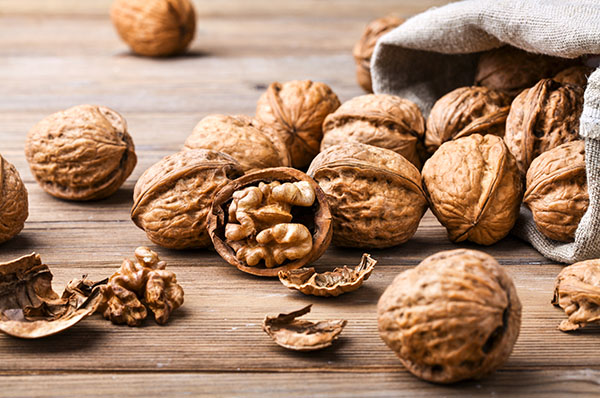- Walnuts are rich in healthy fats (especially omega-3 ALA), protein, fiber, vitamins and antioxidants, making them one of the healthiest nuts available.
- They support heart and brain health, aid digestion, reduce inflammation and help with muscle recovery and satiety, contributing to overall well-being.
- First cultivated in ancient Persia (around 7,000 B.C.), walnuts later spread through Europe and the Americas and were valued for both their medicinal and culinary uses.
- Walnuts are used in a wide range of sweet and savory dishes, including salads, baked goods, stews and pesto, thanks to their rich, crunchy texture.
- While nutrient-dense, walnuts are calorie-rich and a common allergen; opting for organic varieties helps reduce pesticide exposure.
In the vast world of nuts and seeds, walnuts stand out as an exceptionally nutritious superfood. Packed with healthy fats, essential minerals and powerful antioxidants, walnuts offer remarkable benefits for heart health, brain function and digestion. Beyond their impressive nutrient profile, walnuts have a rich history dating back centuries and remain a beloved culinary ingredient worldwide.
Walnuts are the edible seeds of the Juglans tree, primarily Juglans regia (English or Persian walnut) and J. nigra (black walnut). With origins tracing back to ancient Persia (modern-day Iran), walnuts have been cultivated since 7,000 B.C. Traders along the Silk Road introduced them to Europe, and Spanish missionaries eventually brought them to the Americas in the 1700s.
Walnuts were highly valued by ancient civilizations. The Romans considered them food fit for gods, while the ancient Greeks used them medicinally. By the Middle Ages, walnuts had spread across Europe, becoming a staple in both traditional cuisine and medicine.
Nutritional profile and health benefits
Walnuts are a rich source of essential nutrients, making them one of the healthiest nuts available. A one-ounce serving (about 28 grams (g) or a handful) provides:
- 13 g of healthy fats, predominantly polyunsaturated fats like the omega-3 alpha-linolenic acid (ALA)
- 4 g of protein
- 2 g of dietary fiber
- Manganese
- Copper
- Magnesium
- Vitamin E
- Flavonoids
- Melatonin
- Ellagic acid
Walnuts are packed with bioactive components that offer remarkable health benefits. From supporting heart and brain health to aiding digestion and reducing inflammation, walnuts are a versatile superfood that promotes overall well-being. Their unique composition makes them a valuable addition to any diet for long-term vitality and disease prevention.
Here are some of the incredible benefits walnuts have to offer:
Supports heart and brain health. Walnuts are rich in the omega-3 fatty acid ALA which helps lower LDL cholesterol and regulates blood pressure, reducing cardiovascular risks. Their anti-inflammatory properties also enhance cognitive function, improving memory and mental flexibility while protecting against neurodegenerative diseases. (Related: Research consistently finds walnut oil effective against type 2 diabetes.)
Beneficial for muscle repair and satiety. High in plant-based protein and healthy fats, walnuts aid muscle recovery and provide sustained energy. Their fiber and protein content promote satiety, helping with weight management by curbing unhealthy snacking.
Supports digestion and gut microbial balance. Walnuts contain prebiotics that nourish beneficial gut bacteria, thus helping improve digestion and nutrient absorption. A healthy gut microbiome also strengthens immunity and prevents inflammation-linked diseases.
Combats oxidative stress and inflammation. Walnuts are packed with polyphenols and antioxidants like vitamin E that neutralize free radicals and protect against cellular damage. Walnuts’ anti-inflammatory properties also help prevent chronic conditions like cancer and diabetes.
Walnuts are a nutritional powerhouse, but they are also calorie-dense, providing roughly 185 calories per ounce. Moderate consumption is advised to avoid excessive caloric intake. Some individuals may also have allergies to walnuts, which are a common tree nut allergen.
Conventionally grown walnuts may contain pesticides like chlorpyrifos, though their hard shells provide partial protection. Opting for organic walnuts helps minimize exposure to pesticides and other harmful contaminants.
Incorporating walnuts into your diet is one of the simplest ways to boost your overall health. From supporting heart and brain function to enhancing gut microbiome diversity, walnuts prove that small nutritional choices can have profound impacts. For maximum benefits, choose organic walnuts and enjoy them in diverse culinary forms – whether as a snack, topping or key ingredient in gourmet dishes.
This story is not medical advice and is not intended to treat or cure any disease. Always consult with a qualified naturopathic physician for personalized advice about your specific health situation or concern.
Visit NaturalNews.com, a great article source where you can learn about superfoods and their health benefits.
You can also try Brighteon.ai, an AI model created by Mike Adams, also known as the Health Ranger. This model is available as a free download to be run locally and is designed to help share and decentralize knowledge. By doing so, it aims to bypass censorship and empower people with knowledge.
If you’re looking for an uncensored video free speech website where you can openly discuss nutrition, natural medicine, ingredients and more, check out Brighteon.com and these free speech social media sites, Brighteon.IO and Brighteon.social.
Watch this video to learn about the 10 incredible benefits of walnut oil for skin, hair and health.
This video is from the Daily Videos channel on Brighteon.com.
More related stories:
Natural remedies: Males with fertility problems may find help in the walnut leaf.
Walnut oil: One of the best nut oils for your heart and brain.
The English walnut leaf shows potential in treating streptozotocin-induced diabetic peripheral neuropathy.
Sources include:
Brighteon.AI
NaturalNews.com
Brighteon.com
Read full article here


